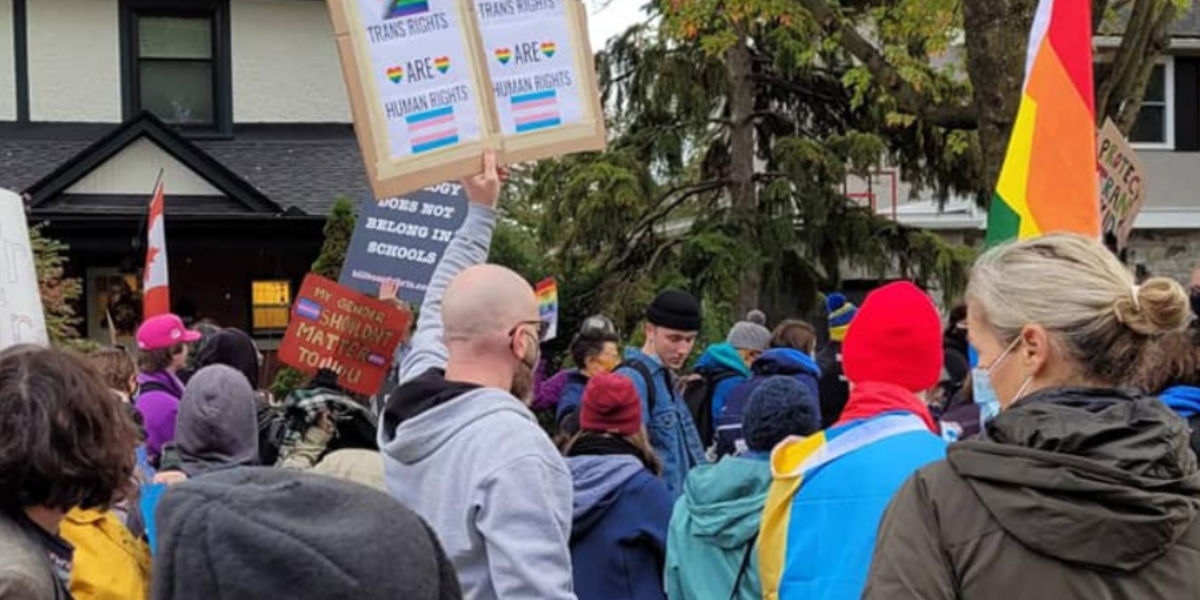Since the three-week long occupation of Ottawa’s downtown by the so-called “Freedom Convoy” in January and February of 2022, Ottawa has continued to be plagued by increasing hate crimes and rallies targeting marginalized communities, including Queer and Trans people.
The repercussions of the convoy are still palpable in our community. The original convoy participants touted hateful and white supremacist imagery including yellow stars, the Confederate flag and swastikas. The movements generated by these individuals have had long-lasting effects of further emboldening white supremacist, transphobic and homophobic actions. The Ottawa Police reported a 23.5 percent increase in hate- and bias-motivated incidents in 2023 compared to 2022, part of a larger concerning trend.
Convoy-adjacent groups fuel anti-2SLGBTQIA+ sentiments
This summer has seen an onslaught of anti-2SLGBTQIA+ rallies organized by convoy-adjacent groups such as “Save Canada” and “Billboard Chris.” These groups repeatedly target Drag Time Story Hour and even highschools and elementary schools. These rallies draw members of the far-right movements from across the country to congregate. In these gatherings, they intimidate, harass and commit violence against queer and trans community members and defenders.
Similar to the convoy, the leaders of these groups benefit from funding from high-powered corporate right-wingers and Christian nationalists to sow division among working class communities. However, these recent actions present a stark change from the original convoy demands around vaccine mandates and lockdown restrictions.
As pandemic restrictions were lifted, many convoy leaders pivoted towards the anti-trans and anti-queer movement to keep up momentum. Needless to say, these movements fail to address the material needs of the many working class members of the convoy, who are deeply affected by the rampant inflation and severe wage suppression. Instead, these movements deflect working class anger away from the rich who benefit from low wages and high prices, and towards fellow members of the working class who are part of queer and trans communities.
Harnessing community response
Since the convoy, Ottawa has seen bursts of inspiring solidarity and collective action, which on-the-ground organizers have worked hard to harness and consolidate forms of resistance through community groups such as Community Solidarity Ottawa.
One of these bursts or organic community action took place in the “Battle of Billings Bridge” in which over a thousand community members stared down newly arrived Freedom Convoy trucks and negotiated a redirect away from the city with open dialogue about the harm the noise pollution and disruption had on the local communities.
Many community members were compelled to take actions of mutual aid due to the ongoing ineffectiveness of the Ottawa Police, who had failed to meaningfully increase safety for community members living in the area. From early on, community groups conducted safe-walks through the crowds of protesters to safeguard the day-to-day life of the community.
The sentiment of shared responsibility for community safety and distrust for the police force has persisted, encouraging self activity among everyday Ottawa residents.
On June 9, when members of anti-trans group, Save Canada, attempted to harass staff and students at three Ottawa schools, hundreds of defenders showed up, forming a human barricade across the road. Organizers leveraged networks formed during the convoy to communicate the urgency of responding to nationally organized far-right anti-trans and anti-queer events.
The history of anti-hate and anti-fascist movements shows us that community-centred defense is the most effective tool to discourage far-right organizing.
This Pride month, Ottawans are celebrating across the city from Stittsville to Hammond. At the same time, Ottawa residents are still fighting an outsized battle against the increased presence of anti-trans and anti-queer rallies. Community Solidarity Ottawa is setting up information and marshall training sessions for those interested in starting ‘flying squads’ to be ready to respond to upcoming rallies as they arise. Organizers are working hard to connect with unions, community groups and non-unionized workplaces to plug them into the fight against hate.
Did you like this article? Help us produce more like it by donating $1, $2, or $5. Donate

